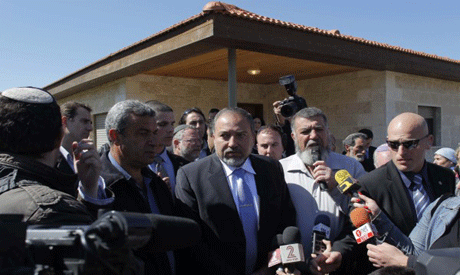
Israeli Foreign Minister Avigdor Lieberman, center, visits the house of the Fogel family, background, in the illegal West Bank settlement of Itamar, near Nablus, Tuesday, (AP).
Mobile homes were installed 500 metres outside the designated boundary of the Itamar Israeli colony near Nablus on Tuesday morning as settlers installed an illegal outpost in memory of Israeli family members slain Saturday, a Palestinian news agency reported.
Investigators have questioned Thai workers in the Itamar colony in relation to the killings of five members of an Israeli family, Ma’an news agency said Monday.
The murder of five members of the Fogel family, including a baby and two children, was taken as an excuse to expand illegal settlement building on Palestinian land as well launch a campaign against Palestinian citizens in neighboring villages in what some officials have called collective punishment.
The settlers placed their mobile homes on privately owned land of Awarta’s Palestinians, the village closest to Itamar, village council chief Qays Awwad told Ma’an. The city of Awarta remains under military lockdown.
Settlers were also reportedly using bulldozers on lands owned by citizens of Nablus. Israel’s civil administration failed to comment on the subject.
This comes after Prime Minister Benjamin Netanyahu approved the building of 500 illegal settler houses in retaliation for the murders.
Israel has put its press under gag order and prohibited the publication of information about the investigation of the murders, which Israeli officials alleged were committed by at least one Palestinian militant as a "terrorist attack", Ma’an reports.
"The direction that's being examined, in general, is a terrorist attack," police spokesman Micky Rosenfeld told AFP.
No Palestinian faction claimed responsibility for the attack nor was any evidence made public by the Israelis pointing towards a particularly "Palestinian" act of terrorism.
Regardless of who carried out the attack or why, Israeli police instantly declared they were on the hunt for a Palestinian. Palestinian security sources told AFP that Israeli soldiers in jeeps had deployed in the sector, sending ambulances to the scene, and said an army helicopter was flying over the area of the attack.
Tensions between Palestinians and Israeli's colonizing in the area have been extremely high in recent days with the Itmar colony is known to harbour some of the most extremist settlers.
On Monday, Israeli soldiers fired live rounds at Palestinians after they clashed with Israeli settlers near Nablus. Ten Palestinians and an Israeli settler were wounded during the violence, according to Palestinian medical sources and a spokesman for the settlers.
A week earlier, following scruffles with Israeli police, settlers firebombed a house in Huwarra village, which saw two Palestinian children taken to hospital for smoke inhalation.
They also smashed up shops and cars in the southern city of Hebron and settlers also cut down 500 olive tree saplings, a practice quite common near settler colonies.
The settlers routinely react when police and soldiers demolish structures in settlements or wildcat settlement outposts in what are known as "price tag" attacks, which almost always target Palestinians.
This violence against the indiginous population is common and claims to counter what the settlers refer to as "anti-settler" activity by the Israeli government.
Israeli Prime Minister Benjamin Netanyahu on Tuesday told hardline settlers that such attacks were unacceptable.
The international community considers Israeli settlements built in the West Bank and east Jerusalem as illegal, and 14 of the 15 members of the UN Security Council last month backed a resolution condemning the Israeli entity for continuing settlement activity.
The United States vetoed the resolution, saying it did not think the United Nations was the appropriate forum to address the issue, but noted its opposition to Israeli settlement building.
Short link: